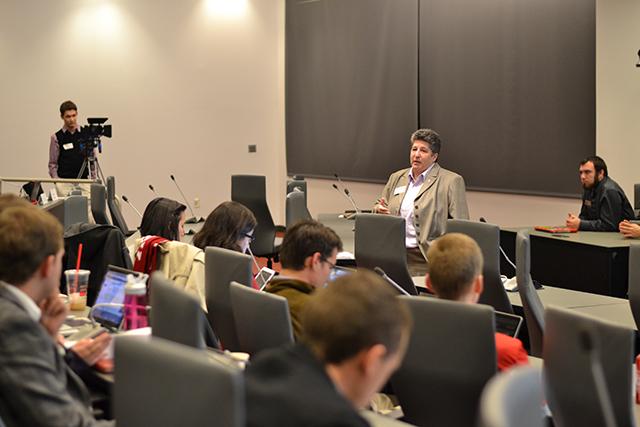Members of the Student Senate passed Resolution 98, the Inclusive Admissions Act, which calls for the University to include an option on admissions applications allowing prospective students to disclose their sexual orientation and gender identity.
The senate passed the bill with ease Wednesday, and although its writer Alex Grindstaff, a senior in biological sciences and College of Sciences senator, said he was hoping for unanimous support, he still dubbed it a “land-slide victory,” and that it was. The bill passed with 34 votes in favor and five votes in opposition. Three student senators abstained and 13 student senators were absent during the vote.
Grindstaff said the bill is an effort to make the University a more welcoming environment for members of the GLBT community.
However, as indicated by the voting record, not everyone supported the bill. Some people argued against the bill on the grounds that it could potentially delay the admissions process or cause uncomfortable situations for members of the GLBT community, according to Grindstaff.
However, the resolution stated that the question about sexual orientation should be optional.
“Some people that were uncomfortable with the GLBT issue—any GLBT issue—were kind of using the excuse that [members of the GLBT community] may be uncomfortable, and they don’t want to be asked that question,” Grindstaff said.
According to Grindstaff, it’s hard to address the issues affecting the GLBT community because it’s difficult to know how many of these students there are on campus. Grindstaff said the best way to reach the GLBT community will be including these questions in the admissions application.
“We can’t go in and ask these students ‘how do you feel?’ because we don’t know who they are,” Grindstaff said. “So volunteering this information allows them to get back to us and provide feedback. ‘Why are you uncomfortable? And what can campus do for you?’”
Grindstaff said he worked with Justine Hollingshead, the director of the GLBT Center, to write the bill. He said Hollingshead helped him with the language of the bill, and she also provided information about what resources are available for the members of the GLBT community.
Hollingshead said she provided background information from schools across the country that have similar types of policies in place regarding collecting demographic data pertaing to sexual orientation and gender identity. According to Hollingshead, fewer than 10 schools in the country provide these questions on their applications.
At the senate meeting, Hollingshead spoke about the GLBT Climate Survey, and she also said she answered questions some of the student senators asked during the debate of the bill.
According to the 2012-2013 GLBT Climate Survey, people in the GLBT community are considered an “invisible” minority because it’s difficult to gather basic demographic information about this community.
The GLBT Climate Survey also said the campus environment could use improvement.
“While participants reported having an overall positive experience at N.C. State, the responses to qualitative survey questions showed specific needs, which should be addressed on campus, including the presence of anti-GLBT people and groups on campus, the prevalence of anti-GLBT mindsets on campus and a lack of benefits for participants’ partners,” the Climate Survey said.
The next step, according to Hollingshead, will be talking to administrators about what this bill looks like from an “operational stand point.”
Though Hollingshead said she doesn’t see the options appearing anytime soon, she said this is a productive way to start a conversation about making them happen.
“When you are a member of a minority community it helps for you to feel like you are included,” Hollingshead said. “It’s just one component of who you are, but it can be critical to also send the message that everyone at N.C. State matters because we are capturing that information.”





